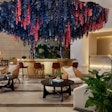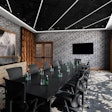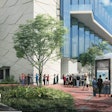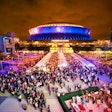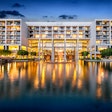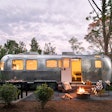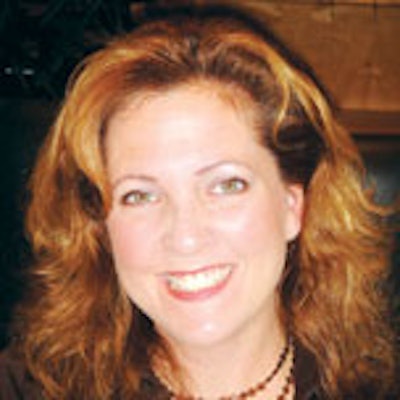
Alison Bossert
Title: Vice president of special events, Columbia TriStar
What She Plans: “I run all the premiere parties and award-show parties. This was a crazy year for us; in 2006, we did 38 events. We also do the gift-giving for the studio.”
Staff: “Three people report to me [a director, a senior coordinator, and an assistant], plus a temp. We’re a really good group. We like each other; it’s important.”
Age: “I’m 39. For the first time.”
Career Path: Bossert graduated from Towson University with a communications degree. She worked in the publicity department of PBS in New York, leaving for grad school at Pepperdine. After working as a junior publicist, she went to the 1996 Olympics in Atlanta as a logistics coordinator. “That was fun and exciting and it said to me, ‘You really want to be in events,’” Bossert says. Back in L.A., she started as a temp in the events department at Columbia TriStar television and worked her way up to the vice president title she’s held for two and a half years.
Biggest Job Challenge: “Probably the politics. You’re dealing with so many egos. It’s the art of negotiation.”
Where She Goes for Inspiration: “I can be looking at a store window and see something that might be really fun at a party. We had water walls at The Pursuit of Happyness premiere; everybody loved them. When you’re building a tent, you don’t expect to have water in there.”
Proudest Career Moment: “I was really proud of The Da Vinci Code in Cannes. We built a pyramid in the harbor, and it could be seen from everywhere. It was lit up at night and really magical.”
Favorite Venue: “The Santa Monica Pier. You can go on rides, play the games. People are walking out with tons of plush toys. It’s not just one of those parties where you’re standing around making small talk. Seeing a grown man in a suit climbing up a rope ladder to grab an alien plush toy is hilarious.”How do you coordinate events around the globe?
[In 2006] we were in Toronto for the film festival; New Orleans for All the King’s Men; San Francisco for The Pursuit of Happyness; New York, obviously; Cannes; L.A. With Cannes, I went over two times before the actual festival to go over the plans and ideas with the designer. And from there you’re dealing with email. Thank God for email; any day or night, you can email people.
Francois Marcade was the production company [in Cannes] that we dealt with, and Francois is the lead guy. His English is not the best. His right-hand person spoke English pretty well, so I dealt more with her, but when Francois and I would write to each other, I would write what I needed in English and then put it in a translation program on the Internet. There were some little nuances here and there that didn’t come across because of the translation, but for the most part it was a great way to help them.
When you stage events in different countries, do you tailor them to different cultures?
Yes. I worked on the Shanghai Film Festival for a Zorro event we did back in 1999. Culturally, it was like walking into another world. In China, negotiations are such a different thing, because [businesspeople feel that they] have to save face. Whereas I am a very direct person—“Can you do this for me or can’t you do this for me? Tell me now”—they’re more like, “Of course, we’ll make this happen,” but they don’t [always]. Like something as silly as candles. I said, “I want these red candles floating in the water, not the white ones.” They said, “Oh, yes. We can get you the red ones.” Well, five minutes before the event started, they didn’t have the red candles. And I said, “What do you have? There are people at the door.” “We have the white ones.” “O.K., fine.” If they’d told me at the beginning they couldn’t get red ones, I would’ve been fine. It’s the difference in culture.
France, not as much. In Cannes, they’re used to people from all over the globe. One interesting thing, though, is that their buffets are not set up like we would set up buffets. They were putting trays of food all over the tables. Some of my guests came and said, “Can you have someone clear the tables? Because there are dirty plates on them.” I said, “No, those aren’t dirty plates. That’s the food.” There were hors d’oeuvres on them. It was a lost-in-translation thing.
What’s your approach to branding at premieres?
It’s the theme of the film. [For] The Pursuit of Happyness, we did a San Francisco theme. As far as putting the movie’s title everywhere in the party, they’ve just seen the movie—it was on the marquee, it was on the invitations. When they come to the party, it doesn’t necessarily have to be in their faces, because we all know what they’re there for.
With so many events, how do you keep them new?
Again, going back to whatever the feel of the movie is. You have to take elements from that to make it unique so that people go, “Oh, yeah, I remember that. It was that film, and you did this with it.” I’ve done over 250 events in my career as far as Sony premieres, and I can remember a lot of them because of something that was unique or different. This past year, we’ve done so many different things. All the King’s Men in New Orleans was a wonderful event, and we felt like we had given a bit of a boost to a city that was so down. All these places lend themselves to something totally different that’s not just an L.A. or New York premiere that you can cookie-cut out and go to a restaurant or go to wherever. You can always find something unique to do.
—Irene Lacher
Title: Vice president of special events, Columbia TriStar
What She Plans: “I run all the premiere parties and award-show parties. This was a crazy year for us; in 2006, we did 38 events. We also do the gift-giving for the studio.”
Staff: “Three people report to me [a director, a senior coordinator, and an assistant], plus a temp. We’re a really good group. We like each other; it’s important.”
Age: “I’m 39. For the first time.”
Career Path: Bossert graduated from Towson University with a communications degree. She worked in the publicity department of PBS in New York, leaving for grad school at Pepperdine. After working as a junior publicist, she went to the 1996 Olympics in Atlanta as a logistics coordinator. “That was fun and exciting and it said to me, ‘You really want to be in events,’” Bossert says. Back in L.A., she started as a temp in the events department at Columbia TriStar television and worked her way up to the vice president title she’s held for two and a half years.
Biggest Job Challenge: “Probably the politics. You’re dealing with so many egos. It’s the art of negotiation.”
Where She Goes for Inspiration: “I can be looking at a store window and see something that might be really fun at a party. We had water walls at The Pursuit of Happyness premiere; everybody loved them. When you’re building a tent, you don’t expect to have water in there.”
Proudest Career Moment: “I was really proud of The Da Vinci Code in Cannes. We built a pyramid in the harbor, and it could be seen from everywhere. It was lit up at night and really magical.”
Favorite Venue: “The Santa Monica Pier. You can go on rides, play the games. People are walking out with tons of plush toys. It’s not just one of those parties where you’re standing around making small talk. Seeing a grown man in a suit climbing up a rope ladder to grab an alien plush toy is hilarious.”How do you coordinate events around the globe?
[In 2006] we were in Toronto for the film festival; New Orleans for All the King’s Men; San Francisco for The Pursuit of Happyness; New York, obviously; Cannes; L.A. With Cannes, I went over two times before the actual festival to go over the plans and ideas with the designer. And from there you’re dealing with email. Thank God for email; any day or night, you can email people.
Francois Marcade was the production company [in Cannes] that we dealt with, and Francois is the lead guy. His English is not the best. His right-hand person spoke English pretty well, so I dealt more with her, but when Francois and I would write to each other, I would write what I needed in English and then put it in a translation program on the Internet. There were some little nuances here and there that didn’t come across because of the translation, but for the most part it was a great way to help them.
When you stage events in different countries, do you tailor them to different cultures?
Yes. I worked on the Shanghai Film Festival for a Zorro event we did back in 1999. Culturally, it was like walking into another world. In China, negotiations are such a different thing, because [businesspeople feel that they] have to save face. Whereas I am a very direct person—“Can you do this for me or can’t you do this for me? Tell me now”—they’re more like, “Of course, we’ll make this happen,” but they don’t [always]. Like something as silly as candles. I said, “I want these red candles floating in the water, not the white ones.” They said, “Oh, yes. We can get you the red ones.” Well, five minutes before the event started, they didn’t have the red candles. And I said, “What do you have? There are people at the door.” “We have the white ones.” “O.K., fine.” If they’d told me at the beginning they couldn’t get red ones, I would’ve been fine. It’s the difference in culture.
France, not as much. In Cannes, they’re used to people from all over the globe. One interesting thing, though, is that their buffets are not set up like we would set up buffets. They were putting trays of food all over the tables. Some of my guests came and said, “Can you have someone clear the tables? Because there are dirty plates on them.” I said, “No, those aren’t dirty plates. That’s the food.” There were hors d’oeuvres on them. It was a lost-in-translation thing.
What’s your approach to branding at premieres?
It’s the theme of the film. [For] The Pursuit of Happyness, we did a San Francisco theme. As far as putting the movie’s title everywhere in the party, they’ve just seen the movie—it was on the marquee, it was on the invitations. When they come to the party, it doesn’t necessarily have to be in their faces, because we all know what they’re there for.
With so many events, how do you keep them new?
Again, going back to whatever the feel of the movie is. You have to take elements from that to make it unique so that people go, “Oh, yeah, I remember that. It was that film, and you did this with it.” I’ve done over 250 events in my career as far as Sony premieres, and I can remember a lot of them because of something that was unique or different. This past year, we’ve done so many different things. All the King’s Men in New Orleans was a wonderful event, and we felt like we had given a bit of a boost to a city that was so down. All these places lend themselves to something totally different that’s not just an L.A. or New York premiere that you can cookie-cut out and go to a restaurant or go to wherever. You can always find something unique to do.
—Irene Lacher











